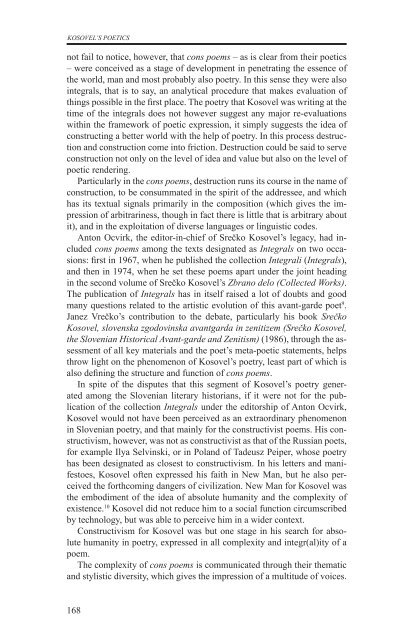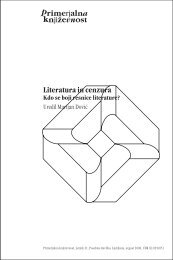razprave (pdf) - Društvo za primerjalno književnost - ZRC SAZU
razprave (pdf) - Društvo za primerjalno književnost - ZRC SAZU
razprave (pdf) - Društvo za primerjalno književnost - ZRC SAZU
- No tags were found...
You also want an ePaper? Increase the reach of your titles
YUMPU automatically turns print PDFs into web optimized ePapers that Google loves.
KOSOVEL’s poeticsnot fail to notice, however, that cons poems – as is clear from their poetics– were conceived as a stage of development in penetrating the essence ofthe world, man and most probably also poetry. In this sense they were alsointegrals, that is to say, an analytical procedure that makes evaluation ofthings possible in the first place. The poetry that Kosovel was writing at thetime of the integrals does not however suggest any major re-evaluationswithin the framework of poetic expression, it simply suggests the idea ofconstructing a better world with the help of poetry. In this process destructionand construction come into friction. Destruction could be said to serveconstruction not only on the level of idea and value but also on the level ofpoetic rendering.Particularly in the cons poems, destruction runs its course in the name ofconstruction, to be consummated in the spirit of the addressee, and whichhas its textual signals primarily in the composition (which gives the impressionof arbitrariness, though in fact there is little that is arbitrary aboutit), and in the exploitation of diverse languages or linguistic codes.Anton Ocvirk, the editor-in-chief of Srečko Kosovel’s legacy, had includedcons poems among the texts designated as Integrals on two occasions:first in 1967, when he published the collection Integrali (Integrals),and then in 1974, when he set these poems apart under the joint headingin the second volume of Srečko Kosovel’s Zbrano delo (Collected Works).The publication of Integrals has in itself raised a lot of doubts and goodmany questions related to the artistic evolution of this avant-garde poet 9 .Janez Vrečko’s contribution to the debate, particularly his book SrečkoKosovel, slovenska zgodovinska avantgarda in zenitizem (Srečko Kosovel,the Slovenian Historical Avant-garde and Zenitism) (1986), through the assessmentof all key materials and the poet’s meta-poetic statements, helpsthrow light on the phenomenon of Kosovel’s poetry, least part of which isalso defining the structure and function of cons poems.In spite of the disputes that this segment of Kosovel’s poetry generatedamong the Slovenian literary historians, if it were not for the publicationof the collection Integrals under the editorship of Anton Ocvirk,Kosovel would not have been perceived as an extraordinary phenomenonin Slovenian poetry, and that mainly for the constructivist poems. His constructivism,however, was not as constructivist as that of the Russian poets,for example Ilya Selvinski, or in Poland of Tadeusz Peiper, whose poetryhas been designated as closest to constructivism. In his letters and manifestoes,Kosovel often expressed his faith in New Man, but he also perceivedthe forthcoming dangers of civili<strong>za</strong>tion. New Man for Kosovel wasthe embodiment of the idea of absolute humanity and the complexity ofexistence. 10 Kosovel did not reduce him to a social function circumscribedby technology, but was able to perceive him in a wider context.Constructivism for Kosovel was but one stage in his search for absolutehumanity in poetry, expressed in all complexity and integr(al)ity of apoem.The complexity of cons poems is communicated through their thematicand stylistic diversity, which gives the impression of a multitude of voices.168
















